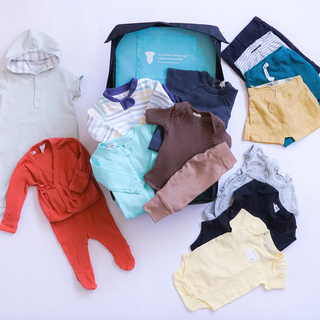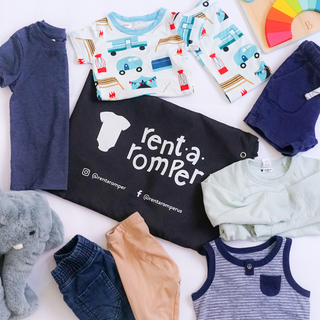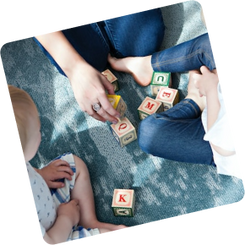female entrepreneurs
November 10, 2022
3 Tips for Preventing Overwhelm in Pregnancy & Parenting with Birthsmarter
Written by Ashley Brichter, Founder of Birthsmarter
As I write this, I am visiting a Birthsmarter educator who recently gave birth to her second baby. My kids are 5 and 8 now, so while we have our flavor of organized chaos at home, it’s substantially different than the intensity of the early days: when it feels like the weight of the world is on your shoulders each and every time you have to make a decision. If this resonates, please know that you’re not alone!
Instead of feeling overwhelmed by the options and the sheer responsibility, I want to ensure every parent has the information, critical thinking skills, and confidence to dial down the worry and maximize the joy!
Over the years, I’ve realized there are three key ways to do this:
- Explore what’s right for you.
- Consider lightening your load.
- Share the mental labor.
Explore What’s Right For You:
When it comes to giving birth and raising a baby, you’ve got to know this: there’s no right way! And there’s no winning or losing. Overwhelm most commonly percolates when we compare ourselves to others – to what we think we “should be” or “should be doing.” The messaging might come from books, family and friends, or worse… random social media accounts! But no matter the credibility, just because something is suggested does not mean it’s the right thing for you, your baby, or your family. We love to look at documentaries like Babies or books like Our Babies Our Selves to remember just how big our world is and how many ways babies can develop.
To figure out what might work best in your home, think critically about three things: first look at the physiological process or what is objectively known, about X. Then consider our societal context and try to understand how and why certain “isms” (capitalism, sexism, racism) have laid the groundwork for conflicting advice and a swinging pendulum of trends. And lastly, consider YOU. Your personal lived experience and family values.
The Venn diagram looks like this:

Whether you’re thinking about labor induction, breastfeeding, sleep training, introducing solids or anything else – it’s so helpful to break down what you’re hearing or reading into these categories and then give yourselves permission to make individual decisions based on your unique situation. If you can make decisions without feeling like you can “mess it up” or like someone will be “judging you,” you’ll find much more freedom throughout parenthood.
Consider Lightening Your Load
Another way we can reduce overwhelm is considering what physical “stuff” is helpful and what might actually be stress inducing. Whether you’ve got presents coming in from baby showers / excited family members, bags of hand-me-downs arriving, or find yourself making middle of the night purchases the amount of stuff acquired in the first year of parenting can be… plentiful.
Certain baby gear, of course, can make our lives much easier! (I would not want to live without baby carriers or strollers that can fold with a single-handed maneuver!) We just need to ensure that the gear enhances your life, instead of dictates it. Many parents fall into a trap of “we have it, so we should use it” sort of parenting.
It’s also important to know that just because a product is on the market, doesn’t mean you need it or that it’s going to solve your problem (if you even have a problem to begin with). And, too much stuff can simply be a headache to clean, store, donate, or sell and your time might be better spent elsewhere.
Share the mental labor.
For folks parenting with a partner at home, it is critical that you are sharing, not just the physical demands of care tasks, but the mental load as well.
What does this mean?
These days, we are seeing partners step into diaper changes, baby wearing, and taking night shifts with gusto (notably different than our parents and grandparents generation). However, it’s still common to see one parent take on the vast majority of all the mental load / cognitive labor / invisible work. When it comes to diapering, for example, while both parents might change diapers, only one parent (typically, the birth mom) is researching diapers, organizing to find a home for the extra diapers, tracking the baby’s growth to see when they need a new size of diapers, considering alternative brands or diaper ointments based on the baby’s skin, and eventually information gathering and planning to start potty training.
Considering that diapering is just one, of mannnnyy tasks which require conception, planning, and execution (think: tracking developmental milestones and communicating with the pediatrician, making medical appointments, organizing feedings, tracking clothing and shoe sizes, arranging for childcare… ) it can be exhausting for this work to fall onto just one person.
Luckily, Fair Play, based on the book by Eve Rodsky, offers families a practical solution. Fair Play is a system for dividing household labor equitably based on mutually agreed upon expectations, clear communication, and an ownership mentality. With or without the Fair Play system, if you are feeling the overwhelm of pregnancy and family life, sharing the mental load is essential to protecting your long term health.
| ASHLEY BRICHTER |

|
Ashley Brichter is birth and postpartum doula, childbirth educator, lactation counselor, certified Fair Play Facilitator, speaker, and entrepreneur. She is the founder of Birthsmarter, which provides unbiased, inclusive, and award-winning, pregnancy and parenting classes in-person throughout New York City and Salt Lake City, and virtually across the world. Born and raised in New York City, she's currently living in Salt Lake City, UT with her husband and two, quickly growing, amazing children. |

























